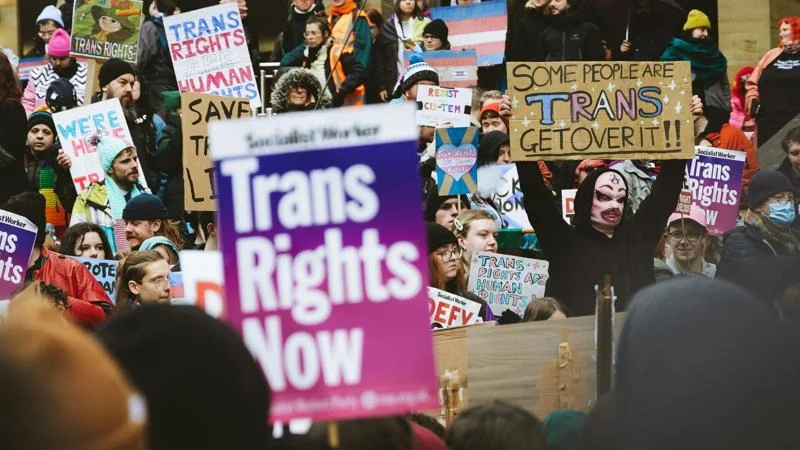The Supreme Court, in a 6-3 decision, upheld a Tennessee law banning minors from receiving transgender medical treatments.
In U.S. v. Skrmetti, the high court analyzed a state law which prevented healthcare providers from administering puberty blockers or hormones to minors with the intent of “enabling the minor to identify with, or live as, a purported identity inconsistent with the minor’s biological sex.”
Tennessee Attorney General Johnathan Skrmetti, defendant in the case celebrated the high court’s decision.
“A bipartisan supermajority of Tennessee’s elected representatives carefully considered the evidence and voted to protect kids from irreversible decisions they cannot yet fully understand,” Skrmetti said. “I commend the Tennessee legislature and Governor Lee for their courage in passing this legislation and supporting our litigation despite withering opposition from the Biden administration, LGBT special interest groups, social justice activists, the American Medical Association, the American Bar Association, and even Hollywood.”
The law did not prevent minors from accessing the treatments in order to treat a congenital defect, precocious puberty, disease or physical injury.
Chief Justice John Roberts wrote the opinion of the court. In the opinion, Roberts addressed the 2020 Bostock v. Clayton County decision, which prohibited employers from discriminating against employees based on sexual orientation or transgender status.
Roberts said the 2020 ruling did not apply to this decision because the restriction for medical treatment is not based on sex, but rather age.
“Unlike the employment discrimination at issue in Bostock, changing a minor’s sex or transgender status does not alter the application of [Tennessee’s law],” Roberts wrote.
Roberts also pointed out Tennessee’s recognition of several consequences which occur from allowing minors access to transgender care.
“The [Tennessee] legislature found that minors lack the maturity to fully understand these consequences, that many individuals have expressed regret for undergoing such treatments as minors, and that the full effects of some treatments may not be known,” Roberts wrote.
Roberts argued state legislators representing constituents should make decisions regarding transgender care for minors based on the evidence.
“Questions regarding the law’s policy are thus appropriately left to the people, their elected representatives, and the democratic process,” Chief Justice John Roberts wrote.
Justices Clarence Thomas, Neil Gorsuch Brett Kavanaugh, Amy Coney Barrett and Samuel Alito concurred with Roberts’ opinion.
“Today Tennessee secured a historic victory for common sense and the rule of law,” said Katherin Green Robertson, chief counsel for the Attorney General of Alabama.
Robertson referenced Justice Clarence Thomas concurring opinion. “Justice Thomas soundly put to rest the persistent sham that we should quiet down and ‘trust the science’ when it comes to life-altering experimentation on minors,” Roberston said.
Justices Sonia Sotomayor, Ketanji Brown Jackson and Elena Kagan dissent. Justice Sotomayor filed the dissenting opinion for the court.
“By retreating from meaningful judicial review exactly where it matters most, the Court abandons transgender children and their families to political whims,” Sotomayor wrote.
Tyler Hack, founder of the Christopher Street Project, a transgender rights group, criticized the decision and its impact across the country.
“Access to gender-affirming care is life-or-death for our trans siblings in Tennessee, and this ruling has just approved the transphobic legislation of 25 other states. It has greenlit a nationwide attempt to infringe on personal medical decisions and violate constitutional rights to privacy. The Supreme Court should know: this domino effect of suffering and more suffering is on their hands,” Hack said.
Sotomayor took issue with Tennessee’s application of the law against puberty blockers and hormone treatments specially for transgender minors. She pointed out the allowance of puberty blockers and hormone treatment for minors with precocious puberty.
She said the specific ban of treatment for minors seeking to identify with a sex different than their assigned at birth sex requires a heightened level of scrutiny in the court.
Sotomayor equated the Tennessee law to a hypothetical ban on minors attending religious ceremonies “inconsistent” with the minor’s religion.
She said minors would be discriminated against under the Tennessee law depending on their sex and the treatment they request.
Due to different treatments based on sex, Sotomayor said the court’s application of scrutiny was not strict enough.
“The majority’s choice to subject [the Tennessee law] to rational-basis-review, the most cursory form of constitutional review, is not only indefensible as a matter of precedent but also extraordinarily consequential,” Sotomayor wrote.






